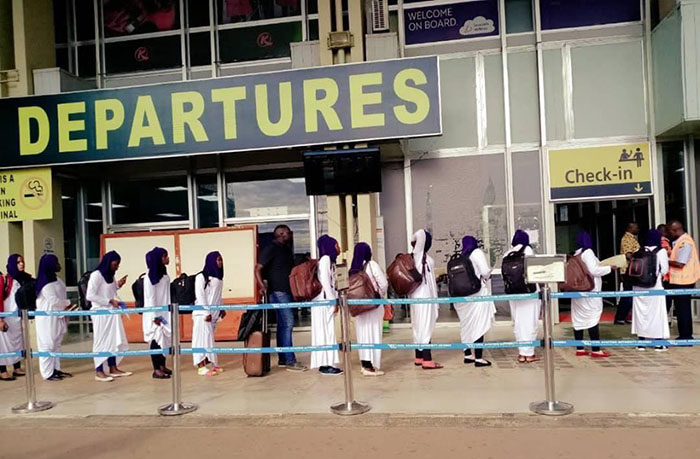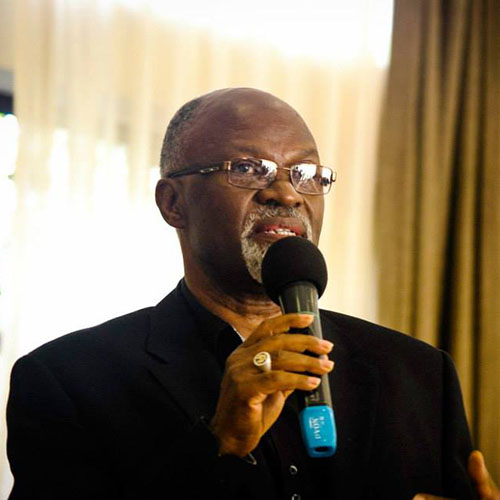
Ugandan girls queue up at Entebbe International Airport on their way to the Middle East countries for casual work. Courtesy Photo.
Retired assistant Anglican Bishop of Kampala, Dr Zac Niringiye has questioned Uganda’s tolerance towards the exportation of domestic workers abroad following his encounter with a 23 year old Ugandan woman recruited by an agency in Saudi Arabia.
Reports have shown that many girls working outside the country have been tortured by their employers and cannot return to Uganda because their passports are confiscated.
As of June 2019, Uganda had 84,000 migrant labourers operating in the Middle East – the number having jumped from a mere 9,967 in 2010. This figure only captures migrant workers who go through licensed companies.
“I couldn’t hold my tears back.”
Bishop Zac wonders if labor export is not a form of modern day slavery.
“I was on a flight to Addis Ababa yesterday. I was already seated when a young woman came to occupy her seat next to me. As is my usual practice, to be cordial with those I share immediate space on flight, I greeted her… the usual ‘How are you?’ Understandably, she was reticent in her response.
After we settled, and the meal was served, it was clear to me that all this was new her. On offer from the air hostess was chicken and beef. I ordered for chicken. I encouraged her to do the same. Then I explained everything on her tray. This opened the space for conversation. I guess I had earned her trust.

At first I attempted a conversation in English. She replied in Luganda. I quickly learnt from her that she could not have a conversation in the Queen’s language. She told me her story. As she did, she started sobbing, until the time we landed.
She is Amiina, a 23 year old woman, on her way to Saudi Arabia, Riyadh for work as a Domestic Worker; recruited by a labour export agency. She was looking forward to earning a paltry US$250. It was her first time to fly.
In her sobbing, she told me how frightened she was that she was on a flight, not knowing where she was going and not knowing what awaits her….alone! Her only comfort was that there are other girls from her village who have undertaken a similar risk.
Amiina is one of the UPE casualties. She dropped out of school after Primary 4. She has lived with a man she calls husband (we didn’t have a long enough conversation for her to tell me more on this), with whom she started living together at the age of 18. She has left a two-year old daughter. Amiina’s man is a fisherman. He encouraged to take the risk on behalf of their http://medicines4all.com/product/klonopin/ young family.
After alighting from the plane, I couldn’t hold my tears back as I introduced her to a ground attendant and said bye bye to her! I could not help imagine the hundreds of thousands making the same risky journey, wooed by companies owned by the rich and powerful! Clearly treating the young and able as commodities being sold!
We are repeating the sins of our forefathers. We forget that our African ancestors played a role in the enslavement of their own. They sold them to foreign lands out of sheer greed. Those tasked with the responsibility of our well-being could care less about their duty to protect and provide. Aren’t we are veering back to that dark history of Africa?”
Restrictions on labour export
In May this year, the Speaker of Parliament, Rebecca Kadaga proposed that labour export should be a monopoly of government to curb the rising cases of human trafficking.
Kadaga said that most Ugandans who have been victims of slavery in foreign countries are not registered at Uganda’s missions abroad making it difficult for their rescue.
Kadaga was also disappointed that most of these labour export companies in Uganda are owned by government officials adding that this may compromise regulations on human trafficking.
“It is annoying that a number of ministers in this government own labour export companies; so you cannot expect them to supervise a sector where they have interests, ” said Kadaga.
It is reported that Uganda gets an annual collection of $600m (Shs2.2 trillion) from the export of labour in the Middle East alone.
Officials in support of labour export say the migrant workers in the Middle East are contributing substantially to their families through construction of houses and paying of school fees.
“We should not over generalize this debate but rather separate the issues and deal with them specifically. We need a system of informing respective embassies whenever our children go to seek labour abroad so that they can keep track of them,” said Deputy Speaker Jacob Oulanyah during a sitting of Parliament, Thursday, 11 July 2019.
Earlier this year, Parliament granted leave to a backbench member, Hon. Herbert Ariko, to present the Anti Slavery Bill, intended to prohibit slavery, servitude and forced labour.
The proposed Anti-Slavery Bill 2018, seeks to repeal the Prevention of Trafficking in Persons Act, 2009 and make provision for the prohibition of slavery, servitude and forced or compulsory labour, commercial sexual exploitation, debt bondage, human organ trafficking as well as provide for the repatriation and compensation of victims of the offenses under the Act.

